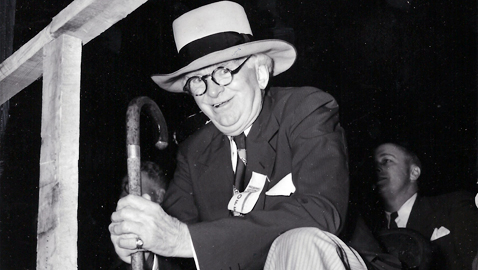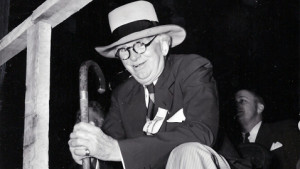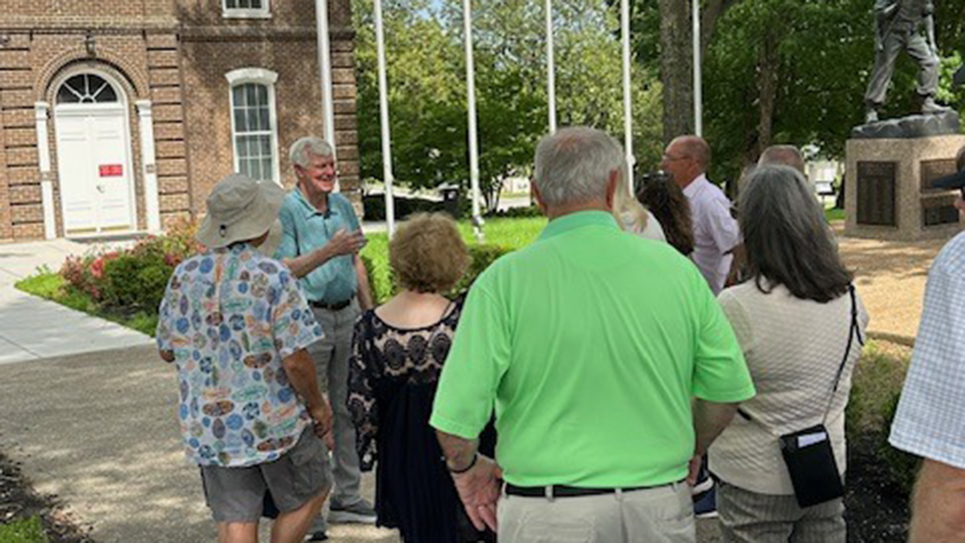Despite encountering stiff opposition to the candidates supported by Shelby County Boss E. H. Crump and Tennessee’s senior United States Senator Kenneth D. McKellar, the two men were supporting Jim Nance McCord for governor in 1944.
McCord had been elected to a single term in Congress, but had held one elective office or another in his native Marshall County for decades. McCord ran for the Democratic gubernatorial nomination without opposition and easily won the general election. Both McKellar and Crump supported Franklin D. Roosevelt’s unprecedented bid for a fourth term that same year.
FDR summoned Crump to the White House as he began his fourth term for a conference. The purpose of the conference was to encourage Crump to convince Senator K. D. McKellar to retire in 1946. Roosevelt was anticipating the post-war world and he thought it would be a better one without McKellar in the Senate. McKellar was then reaching the apex of his political career and wielded enormous influence in the United States Senate. He had just been elected President Pro Tempore by his colleagues and was the Acting Chairman of the Senate Appropriations Committee, as well as Chairman of the Senate’s Post Office Committee. FDR likely did not wish to have to contend with the McKellar influence in the Senate.
Crump told President Roosevelt that McKellar intended to run again in 1946 and to which FDR replied that if he did, McKellar would be beaten. Crump, understanding Tennessee politics far better than FDR, retorted McKellar would not only run again, but would be reelected to a sixth term. Crump was right; McKellar was reelected to another term in the United States Senate and by that time FDR lay in his own grave.
Crump decided in 1945 to give up his post as Tennessee’s committeeman on the Democratic National Committee. Morristown businessman Herbert S. “Hub” Walters, a McKellar stalwart, took Crump’s place on the national committee.
The opposition to the McKellar – Crump domination of Tennessee politics made a stronger effort in the 1946 elections. Edward “Ned” Carmack had quite nearly defeated junior United States Senator Tom Stewart in 1942 and Stewart’s margin of victory had come from Shelby County. Carmack was eager to hold public office and had announced as a candidate for governor in 1944, but had dropped out well before the primary. Chattanooga Congressman Estes Kefauver had seriously considered running against McKellar, but after making a few inquiries decided the old senator was still a formidable candidate. Kefauver opted to run again for Congress, leaving Carmack to make the race against Senator McKellar.
Jim McCord was to be opposed by former governor Gordon Browning, who remained in Europe following the allied victory in World War II as part of the military government. Browning’s campaign would be run in absentia, while Carmack carried most of the brunt of the actual campaigning. McCord and McKellar ran as a ticket, along with Andrew “Tip” Taylor for the Public Service Commission. As it turned out, McKellar’s own campaign was run in absentia. Despite several announcements McKellar was returning to Tennessee to personally participate in the campaign, the senator remained in Washington, D. C. Tennessee was brutally hot throughout the summer of 1946 and Senator McKellar was plagued by various ailments and illnesses and his campaign managers thought it best for him to remain at his post of duty in the Senate.
Tennesseans were once again treated to Crump purchasing full-page ads in newspapers throughout the state promoting Senator McKellar and Governor McCord. In his ads, the Memphis Boss ridiculed the opposition to the McCord – McKellar ticket. Crump’s loathing of Gordon Browning was as profound as ever. Crump’s comments about the former governor were as pointed as they had been during Browning’s failed reelection bid in 1938. Crump had claimed a particular art gallery in France held no less than twenty-six pictures of Judas Iscariot and opined, “None look alike, but they all resemble Gordon Browning.”
Unlike 1942, the election was not close. Senator McKellar thrashed Ned Carmack without having even returned once to Tennessee to campaign for reelection personally. Governor McCord easily defeated Gordon Browning. It was to be the last election which the McKellar – Crump alliance won a smashing victory.
Yet in Memphis Crump remained as strong as ever. Memphis had won several nationally prestigious awards over the years and the municipal stadium in Memphis was named for Crump. The machine’s candidates occupied virtually every office in both the city and county governments.
As the 1948 elections loomed, Crump, like many Southerners, was growing increasingly alarmed by President Harry Truman’s commitment to civil rights. Oddly one of Crump’s strongest objections to Truman was the fact the Missourian had come from the Pendergast machine in Kansas City. Crump and McKellar both were dissatisfied with Truman and the Memphis Boss was soon indicating he would support the State’s Right ticket of South Carolina Governor Strom Thurmond and Mississippi Governor Fielding Wright. McKellar refused to leave the Democratic Party following the convention nominating Truman, but he told Crump he held out little hope for Truman being elected.
Crump’s dissatisfaction was hardly confined to Harry Truman; the Memphis Boss was not enthused about Senator Tom Stewart, who was also up for reelection in 1948. Crump had been mortally embarrassed wen Stewart had been reelected in 1942 on the basis of the vote returns in Shelby County. Crump was also constantly reminded by Will Gerber, a prominent attorney and sometime Crump officeholder in Shelby County, that Stewart very well might be anti-Semitic, though there was little in Stewart’s record to reflect that allegation. In December of 1947 came the announcement Crump would not support Senator Stewart for renomination in the Democratic primary the following year. Many expected Stewart to simply meekly retire to private life rather than run again and Crump probably thought the same thing. Stewart stubbornly insisted he would be a candidate with or without Crump’s support. Congressman Estes Kefauver, seeing his opportunity with the split in the machine, declared he, too, would be a candidate. It proved to be Crump’s single biggest political miscalculation and mistake.
Crump’s senatorial candidate was Judge John A. Mitchell of Cookeville who was a cousin of former Congressman J. Ridley Mitchell, who had been a Crump opponent. Crump had never even met John Mitchell, although he related he heard fine things about the judge.
Senator McKellar wrote Crump to say he had informed his junior colleague that he could not help him win reelection and noted Stewart had taken the news “coolly”. McKellar went on to confess that Senator Stewart had “not had much to do with me since.” McKellar admitted he was embarrassed by the situation and told the Memphis Boss he did not believe Judge Mitchell could win.
As the election approached, Crump grew increasingly uneasy and Senator McKellar stressed the importance of defeating Congressman Kefauver. There were indications Crump intended to drop his support of Judge Mitchell and again back Senator Stewart. The Kefauver campaign having heard the rumors, shrewdly predicted Crump would abandon John Mitchell and throw his support to Tom Stewart. Crump reacted as they hoped, denouncing the claim as a lie. He stuck with Mitchell to the bitter end and Kefauver won the senatorial nomination. Crump’s blunder was compounded by the defeat of Governor Jim McCord by Gordon Browning, who was back in Tennessee and campaigning in person.
McCord, believing education needed more support in Tennessee, had convinced the legislature to institute a sales tax. Tennesseans, not surprisingly, liked the free textbooks the tax provided, but did not like the tax. Browning beat McCord soundly. The Crump candidates had been overwhelmingly rejected at the polls and the Memphis Boss’s own influence would sink further when Harry Truman was elected that fall. Although Thurmond carried Shelby County, Truman carried Tennessee.
The 1948 elections destroyed whatever national influence Ed Crump still possessed; the long rule of the McKellar – Crump alliance in Tennessee was shattered. Both Crump and McKellar were aging and when the old senator announced in the summer of 1951 he would run for a seventh term, the Memphis Boss discreetly tried to talk McKellar out of running. McKellar was eighty-two years old, frequently ill, and out of touch with many Tennesseans. Once McKellar’s mind was made up, Crump determined to support his old ally again. Crump also threw the backing of the Shelby County machine to young Frank Clement who was making a strong bid to unseat the hated Governor Gordon Browning.
McKellar lost to Congressman Albert Gore, Sr., while Clement beat Browning. Crump was pleased with Browning’s defeat, but it was to be his last statewide election success. The Memphis Boss was himself aging and contented himself with local matters, his financial affairs, and his family. Little escaped the Memphis Boss’s attention and he remained approachable by nearly everyone and his directives to city and county officials continued to flow from his office. Crump enjoyed watching the squirrels cavort in his yard and remained the “Boss” until death carried him away.
E. H. Crump died on October 16, 1954. Among the many mourners at Crump’s funeral was his long-time political partner and friend, former Senator Kenneth D. McKellar. McKellar was “in pretty bad shape” at the funeral, distraught by the close of a friendship and association that spanned almost five decades.
Crump’s influence in Memphis and Shelby County lasted several years following his passing. There are still numerous reminders in Memphis of Crump’s long rule and there is an imposing of statue of E. H. Crump in Overton Park. The statue still surveys what was once completely Crump’s domain.








